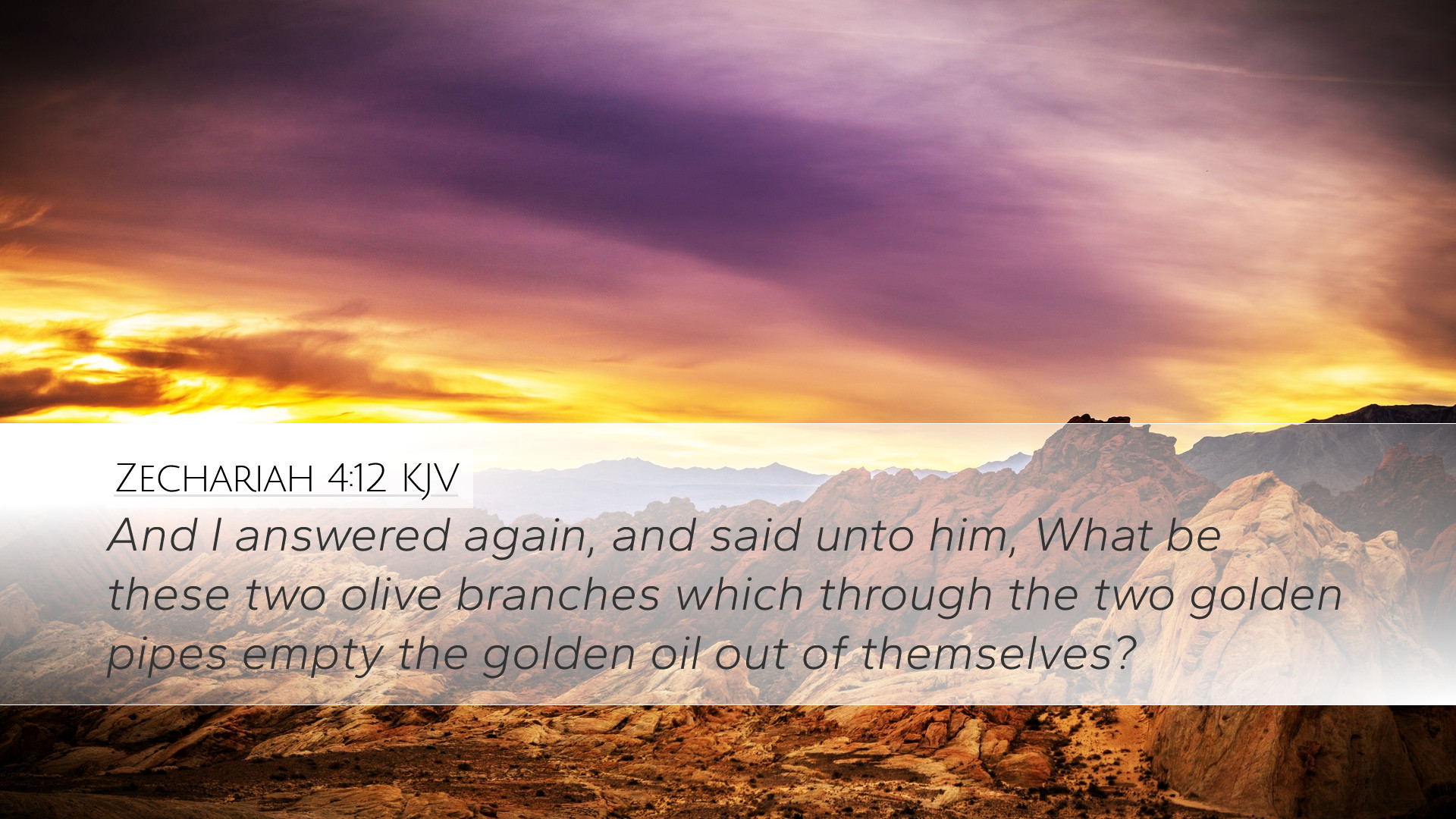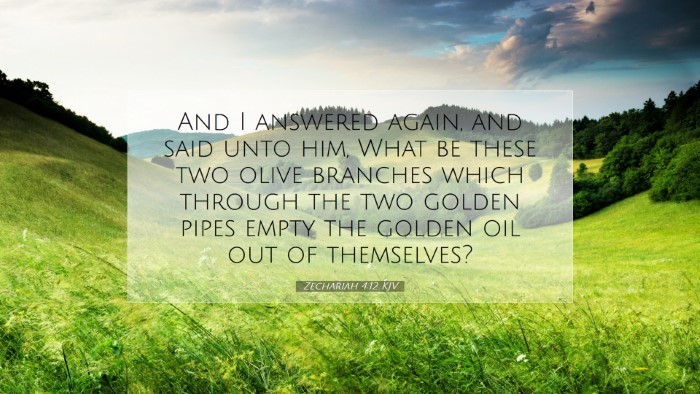Old Testament
Genesis Exodus Leviticus Numbers Deuteronomy Joshua Judges Ruth 1 Samuel 2 Samuel 1 Kings 2 Kings 1 Chronicles 2 Chronicles Ezra Nehemiah Esther Job Psalms Proverbs Ecclesiastes Song of Solomon Isaiah Jeremiah Lamentations Ezekiel Daniel Hosea Joel Amos Obadiah Jonah Micah Nahum Habakkuk Zephaniah Haggai Zechariah MalachiZechariah 4:12
Zechariah 4:12 KJV
And I answered again, and said unto him, What be these two olive branches which through the two golden pipes empty the golden oil out of themselves?
Zechariah 4:12 Bible Commentary
Commentary on Zechariah 4:12
Zechariah 4:12 states: "And I answered again, and said unto him, What be these two olive branches which through the two golden pipes empty the golden oil out of themselves?" This verse frames a profound vision within Zechariah’s apocalyptic imagery, rich in symbolism and theological significance. Scholars, pastors, and ambitious students of the Word can garner deep insights from this passage as we delve into its implications, drawing from esteemed public domain commentaries.
Understanding the Context
The Book of Zechariah falls within the Minor Prophets and addresses both the physical and spiritual restoration of Israel post-exile. Particularly, this verse appears amid a series of visions that reveal God’s intentions for His people. The symbolism of oil and the olive branches is central to understanding the anointing and empowerment bestowed by God upon His chosen leaders.
The Significance of Olive Oil
In ancient Israel, olive oil had significant cultural and religious importance. It was used in the sanctuary, anointing the high priests and kings, and signified divine favor and the presence of the Holy Spirit. Matthew Henry comments that olive oil represents the grace of God and the spiritual nourishment essential for sustaining the people and leaders of Israel. This suggests that leadership, represented by the two branches, must be firmly rooted in divine empowerment.
The Two Olive Branches
The phrase "two olive branches" can be interpreted as a representation of two specific entities or leaders through whom God channels His blessings. Albert Barnes posits that these two branches symbolize Joshua, the high priest, and Zerubbabel, the civil leader. Together, they embody the unified leadership necessary for the restoration of the temple and, by extension, the nation of Israel.
- Joshua - Symbol of spiritual authority and priestly anointing.
- Zerubbabel - Representing the political leadership and physical rebuilding of the temple.
The Golden Pipes and Their Meaning
The "two golden pipes" that convey the olive oil deliver the message of connection between heaven and earth. Adam Clarke describes these pipes as conduits for divine grace, illustrating that God continually supplies His anointing power to His appointed servants. This signifies that the support, strength, and resources necessary for maintaining spiritual life and leadership come directly from God.
The Symbolism of the Number Two
The specific mention of two in this verse carries weight in biblical numerology, often representing divine order and witness. As Henry notes, two witnesses are required for validation. Here, Joshua and Zerubbabel serve not only as leaders but as witnesses to God’s promises for restoration and blessings. Their collaborative work exemplifies the necessity of cooperative ministry in fulfilling God's mission.
Application for Modern Believers
For contemporary pastors and theologians, the imagery in Zechariah 4:12 encourages reflection on the dynamics of spiritual leadership and the source of sustenance in ministry. Just as the olive trees provided oil, leaders today must seek the continuous flow of God's Spirit through prayer, the Word, and community support.
- Equipping Leaders: Encourage the development of leadership teams that are spiritually aligned and mutually supportive.
- Relational Ministry: Emphasize the necessity for collaboration among church leadership and congregations.
- Dependence on God: Remind congregations that true empowerment and resources for ministry must come from God.
Theological Reflections
The spiritual implications of this passage extend into the New Testament era, where Christ becomes the ultimate source of living water and oil, serving as both King and Priest. Believers are called to be conduits of His grace, just like the olive trees. As the Church, we are positioned to receive and disperse His anointing, which empowers us to fulfill our divine calling.
Conclusion
Ultimately, Zechariah 4:12 masterfully depicts the unity of spiritual and civil leadership under God's anointing. For scholars and students, it serves as a reminder of the importance of God’s empowerment in their ministries. As we reflect on these layers of meaning, we encourage a posture of humility, reliance on the Lord, and an eagerness to be led by His Spirit as we navigate our faith journeys.


